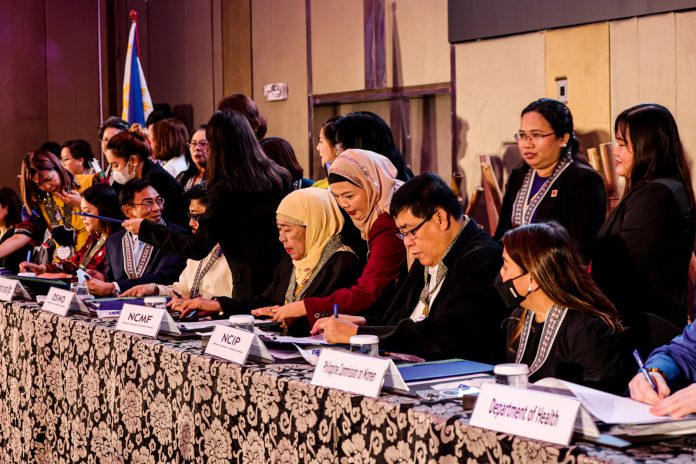Philippine government agencies on Wednesday, December 7, finally signed the implementing rules and regulations (IRR) of Republic Act 11596, also known as “An Act Prohibiting the Practice of Child Marriage and Imposing Penalties.”
The law, which was signed by former president Rodrigo Duterte on Dec. 10, 2021, aims to abolish “unequal structures and practices that perpetuate discrimination and inequality.”
Child marriage refers to any marriage entered into where one or both parties are children and solemnized in civil or church proceedings, or in any recognized traditional, cultural, or customary manner.
It shall include an informal union or cohabitation outside of wedlock between an adult and a child, or between children.
In a statement, members of the “Girl Defenders” welcomed the signing of the implementing rules and regulations of the law.
Oxfam Pilipinas executive director Erika Geronimo said the signing of the IRR is “a major milestone for the Philippines in its efforts to end Violence Against Women and Girls, and Child, Early and Forced Marriage.”
“We know that we need to continue our efforts to ensure the proper implementation of this IRR – a collective responsibility requiring a coordinated multi-sectoral approach,” said Geronimo.
“We are sure that everyone is up to the challenge, to continue brokering new conversations to shift negative norms, until we achieve the world we have envisioned when we started on the mutual journey to end child marriage,” she added.
The Philippine Legislators Committee on Population Development (PLCPD), which is also part of the “Girl Defenders” Alliance, said that the signing of the IRR “is just the beginning of a long battle to protect the rights of women and girls.”
“Half of our work is done with the enactment of the law. Now that the IRR is ready for rollout, we have to continue to work together to ensure the full and meaningful implementation of RA 11596,” said PLCPD executive director Romeo Dongeto.
Data show that the Philippines ranks 12th among countries with the highest numbers of child marriages. One in six Filipino girls are married before they turn 18.
Under the law, the facilitation and solemnization of child marriage and cohabitation of an adult with a child outside wedlock shall be declared “unlawful and prohibited acts.”
“The foregoing unlawful and prohibited acts are deemed public crimes and can be initiated by any concerned individual,” read Section 5 of RA 11596.
Any person who causes, fixes, facilitates or arranges a child marriage shall suffer the penalty of “prision mayor” in its medium period and a fine of not less than PhP40,000.
However, should the perpetrator be an ascendant, parent, adoptive parent, step parent, or guardian of the child, the penalty shall be “prision mayor” in its maximum period, a fine of not less than PhP50,000, and perpetual loss of parental authority.
Any person who performs or officiates a child marriage shall suffer the penalty of “prision mayor” in its maximum period and a fine of not less than PhP50,000 in addition to perpetual disqualification from office if he or she is a public officer.
An adult partner who cohabits with a child outside wedlock shall suffer the penalty of “prision mayor” in its maximum period and a fine of not less than PhP50,000, and may be perpetually disqualified from holding office at the discretion of the courts if the perpetrator is a public officer.
“Prision mayor” is an “afflictive” type of penalty in terms of incarceration. Its minimum period is six years and one day to eight years, while its medium period is eight years and one day to 10 years.
RA 11596 directs the Department of Social Welfare and Development (DSWD) to take the lead in the implementation of the Act and create programs that will address the prevalence of child marriage and provide appropriate services, including but not limited to legal services, health services, psychosocial services, counseling, educational, livelihood and skills development, temporary shelter, and all other assistance necessary to protect victims of child marriage and their offspring. It shall include awareness campaigns on the negative effects of child marriage.
Under the new law, the Department of Education shall include culturally-sensitive and age-appropriate modules and discussions on the impacts and effects of the child marriage in its comprehensive sexuality education curriculum.
The Department of the Interior and Local Government, on the other hand, shall institute a systematic information and prevention campaign against child marriage through barangay-level education programs and initiatives that are culturally-sensitive and child-centered.









